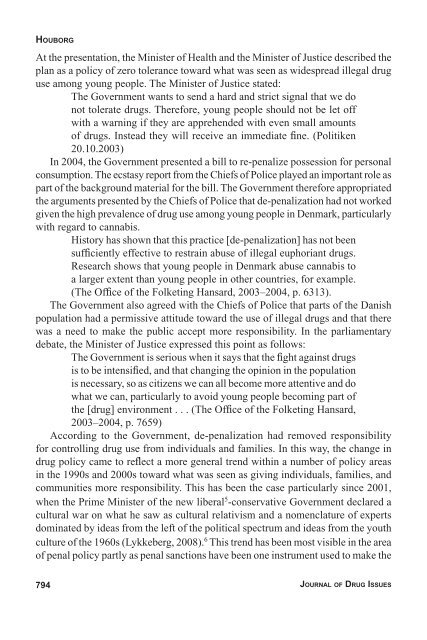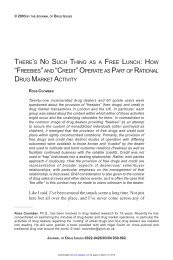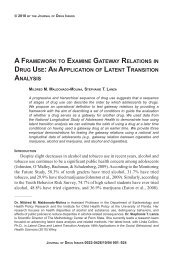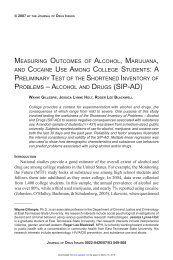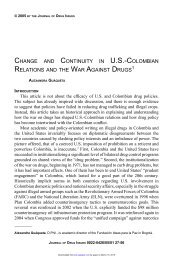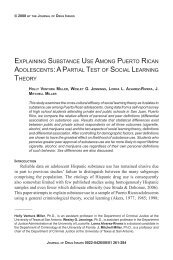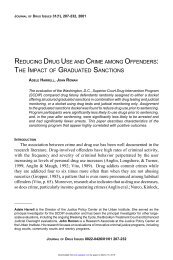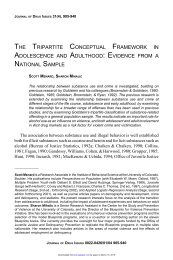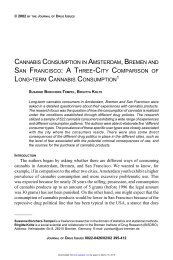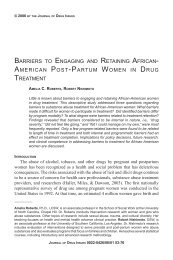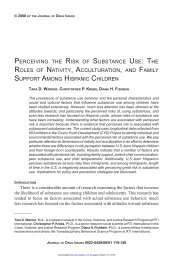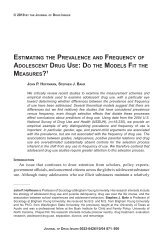HOUBORGAt the presentation, the M<strong>in</strong>ister <strong>of</strong> Health <strong>and</strong> the M<strong>in</strong>ister <strong>of</strong> Justice described theplan as a <strong>policy</strong> <strong>of</strong> zero tolerance toward what was seen as widespread illegal <strong>drug</strong>use among young people. The M<strong>in</strong>ister <strong>of</strong> Justice stated:The Government wants to send a hard <strong>and</strong> strict signal that we donot tolerate <strong>drug</strong>s. Therefore, young people should not be let <strong>of</strong>fwith a warn<strong>in</strong>g if they are apprehended with even small amounts<strong>of</strong> <strong>drug</strong>s. Instead they will receive an immediate f<strong>in</strong>e. (Politiken20.10.2003)In 2004, the Government presented a bill to re-penalize possession for personalconsumption. The ecstasy report from the Chiefs <strong>of</strong> Police played an important role aspart <strong>of</strong> the background material for the bill. The Government therefore appropriatedthe arguments presented by the Chiefs <strong>of</strong> Police that de-penalization had not workedgiven the high prevalence <strong>of</strong> <strong>drug</strong> use among young people <strong>in</strong> Denmark, particularlywith regard to cannabis.History has shown that this practice [de-penalization] has not beensufficiently effective to restra<strong>in</strong> abuse <strong>of</strong> illegal euphoriant <strong>drug</strong>s.Research shows that young people <strong>in</strong> Denmark abuse cannabis toa larger extent than young people <strong>in</strong> other countries, for example.(The Office <strong>of</strong> the Folket<strong>in</strong>g Hansard, 2003–2004, p. 6313).The Government also agreed with the Chiefs <strong>of</strong> Police that parts <strong>of</strong> the Danishpopulation had a permissive attitude toward the use <strong>of</strong> illegal <strong>drug</strong>s <strong>and</strong> that therewas a need to make the public accept more responsibility. In the parliamentarydebate, the M<strong>in</strong>ister <strong>of</strong> Justice expressed this po<strong>in</strong>t as follows:The Government is serious when it says that the fight aga<strong>in</strong>st <strong>drug</strong>sis to be <strong>in</strong>tensified, <strong>and</strong> that chang<strong>in</strong>g the op<strong>in</strong>ion <strong>in</strong> the populationis necessary, so as citizens we can all become more attentive <strong>and</strong> dowhat we can, particularly to avoid young people becom<strong>in</strong>g part <strong>of</strong>the [<strong>drug</strong>] environment . . . (The Office <strong>of</strong> the Folket<strong>in</strong>g Hansard,2003–2004, p. 7659)Accord<strong>in</strong>g to the Government, de-penalization had removed responsibilityfor <strong>control</strong>l<strong>in</strong>g <strong>drug</strong> use from <strong>in</strong>dividuals <strong>and</strong> families. In this way, the change <strong>in</strong><strong>drug</strong> <strong>policy</strong> came to reflect a more general trend with<strong>in</strong> a number <strong>of</strong> <strong>policy</strong> areas<strong>in</strong> the 1990s <strong>and</strong> 2000s toward what was seen as giv<strong>in</strong>g <strong>in</strong>dividuals, families, <strong>and</strong>communities more responsibility. This has been the case particularly s<strong>in</strong>ce 2001,when the Prime M<strong>in</strong>ister <strong>of</strong> the new liberal 5 -conservative Government declared acultural war on what he saw as cultural relativism <strong>and</strong> a nomenclature <strong>of</strong> expertsdom<strong>in</strong>ated by ideas from the left <strong>of</strong> the political spectrum <strong>and</strong> ideas from the youthculture <strong>of</strong> the 1960s (Lykkeberg, 2008). 6 This trend has been most visible <strong>in</strong> the area<strong>of</strong> penal <strong>policy</strong> partly as penal sanctions have been one <strong>in</strong>strument used to make the794 JOURNAL OF DRUG ISSUES
CONTROL AND WELFARE IN DANISH DRUG POLICYDanes more responsible. With<strong>in</strong> penal <strong>policy</strong>, a number <strong>of</strong> tough-on-crime <strong>in</strong>itiatives<strong>and</strong> new crim<strong>in</strong>alizations were <strong>in</strong>troduced <strong>in</strong> the 1990s <strong>and</strong> 2000s (Balvig, 2004;Nielsen, 2006). In light <strong>of</strong> these changes <strong>in</strong> the political culture <strong>in</strong> Denmark, it ishardly surpris<strong>in</strong>g that possession <strong>of</strong> illegal <strong>drug</strong>s for personal consumption wouldbe re-penalized <strong>in</strong> 2004. The <strong>policy</strong> <strong>of</strong> de-penalization was an obvious example <strong>of</strong> a<strong>welfare</strong> approach to crime <strong>control</strong> from which the new penal <strong>policy</strong> was distanc<strong>in</strong>gitself. The use <strong>of</strong> illegal <strong>drug</strong>s was no longer seen as a symptom <strong>of</strong> more fundamentalsocial <strong>and</strong> cultural factors to be addressed through <strong>welfare</strong> <strong>and</strong> cultural policies, butas an <strong>in</strong>dividual choice by consumers. The fact that consum<strong>in</strong>g illegal <strong>drug</strong>s wasbecom<strong>in</strong>g <strong>in</strong>creas<strong>in</strong>gly common caused partly by a permissive <strong>welfare</strong> <strong>policy</strong> thathad removed responsibility from <strong>in</strong>dividuals <strong>and</strong> families <strong>and</strong> weakened formal <strong>and</strong><strong>in</strong>formal <strong>control</strong> as well as self-restra<strong>in</strong>t. In the parliamentary debate on the newlegislation, it was explicitly described as part <strong>of</strong> the new penal <strong>policy</strong> by members<strong>of</strong> the rul<strong>in</strong>g coalition.Then there is a third po<strong>in</strong>t, which is that now, <strong>and</strong> this is badly needed, as ageneral rule, a f<strong>in</strong>e is issued to those found <strong>in</strong> possession <strong>of</strong> hash or ecstasy or thelike, no matter whether it is half a gram or two grams, <strong>and</strong> no matter whether it is forpersonal consumption or not. The law is the law, <strong>and</strong> the law should be respected.This is the way to build any proper society. It really has been utterly grotesque thatfor many years the legislation has clearly said that it is a crim<strong>in</strong>al <strong>of</strong>fence to smokehash, <strong>and</strong> yet those who use <strong>drug</strong>s have been told: yes, yes, you are not allowedto do it. And next time they do it: yes, yes, you are not allowed to do it. This isreally the same k<strong>in</strong>d <strong>of</strong> laxness we have had toward juvenile del<strong>in</strong>quents for manyyears with charges dropped time after time. (The Office <strong>of</strong> the Folket<strong>in</strong>g Hansard,2003–2004, p. 7651).In 2007, the construction <strong>of</strong> <strong>drug</strong> users as rational <strong>and</strong> self-responsible actorswas underscored when f<strong>in</strong>es for possession <strong>of</strong> illegal <strong>drug</strong>s were raised. In 2004, them<strong>in</strong>imum f<strong>in</strong>e was set at EUR 67 (for possession <strong>of</strong> up to 10 gr. cannabis) whichwas raised to EUR 269 <strong>in</strong> 2007. The M<strong>in</strong>ister <strong>of</strong> Justice claimed that 18, 989 7 casesfor violat<strong>in</strong>g the Law on Euphoriant Substances <strong>in</strong> 2005 showed that a significantnumber <strong>of</strong> young people were still us<strong>in</strong>g illegal <strong>drug</strong>s. The M<strong>in</strong>ister therefore wantedto <strong>in</strong>crease f<strong>in</strong>es to improve the deterrent effect.Illegal possession <strong>of</strong> euphoria-<strong>in</strong>duc<strong>in</strong>g <strong>drug</strong>s must be considered a crim<strong>in</strong>al<strong>of</strong>fence that should have clear <strong>and</strong> noticeable consequences, even if the <strong>drug</strong> isonly for personal consumption. This, <strong>in</strong> the op<strong>in</strong>ion <strong>of</strong> the M<strong>in</strong>istry, is not reflectedsufficiently <strong>in</strong> the exist<strong>in</strong>g level <strong>of</strong> f<strong>in</strong>es. The punishment metered out shouldtherefore clarify that possession <strong>of</strong> illegal <strong>drug</strong>s for personal consumption is notacceptable. A more noticeable sanction will also hopefully contribute toward keep<strong>in</strong>gparticularly young people from us<strong>in</strong>g illegal <strong>drug</strong>s. (Justice Department, 2007, p. 15f)FALL 2010795


